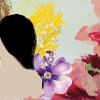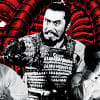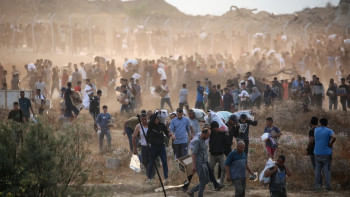After the rain

While leaving the institute, a nurse gave me a packet of cigarettes as a token of friendship. I sat on the grassy lawn secured with a chain link fence, took a cigarette out of the packet, and wedged it between my lips. It was one of those slow afternoons when leaves didn't stir and clouds didn't move—only occasionally crows cawed from some magnolia branches, as though waking people up from a reverie. Behind me stood the three-story facility, its red walls peeled off by age and humidity. With no one to disturb my silence, no residents guffawing or raving, I could finally enjoy a silent afternoon on my own. It was strange to be able to sit under the open sky as a part of me didn't want to leave, wanted to go back inside the institute, my second home where I spent 36 years of my life, more than half of which passed sleeping. I was lucky to have never been chained to bedposts, which was done to some patients to avoid violence and aggression. Getting a second chance to live, I knew I wouldn't return there and squander it.
Of all things, I wished to see myself in front of a mirror. Were there any remnants of youth and handsomeness on my face? Or did I turn ugly, so bad that my appearance would frighten strangers and kids? Or was it a face of age and wisdom, with tufts of grey hair resting on my head? I had no idea what I looked like, but I knew that nobody would believe that I was born into a very wealthy family. My father always told me that your birth was just a coincidence in the grand scheme of things. "You are not made of something superior. You and our servants have the same blood. We come from the same a'lam arwa, the world of souls", he told me one day while I was playing hoopla with my brothers, aiming at targets strewn on the grassy backyard. I wouldn't have known that disguised in his grandiose speech was the truth of my birth, that I was born out of wedlock in the womb of one of his servants, a woman I'd never know. She was sent away soon after my birth.
I was simply a child, fighting with my siblings or crying out for help when I didn't win in a fight. I'm not ashamed to tell you this: my father kept knocking up servants and his legally married wife ended up having six babies to raise, none from her womb. There was simply no place for her outside of the dictation of my father's world, so she ended up doing what any mother is expected to do. She raised us, fed us, bathed us, and even put us to sleep, singing lullabies about marauders coming to our land and harming peasants' wives and stealing their kids. I can't tell if she loved us, perhaps she did, perhaps she didn't. A thin, wispy woman in my memory, always fighting with my father for something not right in the house. Although she never named it, we kids knew. We knew she wasn't our mother; she was simply passing her years with us. She had nowhere else to go, no laws to protect her rights, no friends to console her. As though to balance the turmoil in the family, my father prospered outside, in his ship-making business. The only good thing he did for us was bring home a projector and run foreign films—mostly Indian and Iranian and occasionally Hollywood, films that came out not so recently but years and decades ago. He watched them with us in the garden, seated on his old Burmese teak chair, surrounded by sash-wearing servants while everyone else, including my mother, sat on the grass.
I didn't know where it came from, probably the movies had something to do with it. I grew up believing I was meant for greater things in life. I'd been acting since high school, a passion I continued with utmost honesty. Years later, after influential letters and phone calls from my father, I signed my first film contract that earned me 30,000 taka. It was a lot back then, for a young bachelor I mean, but I compensated for all the losses of my early youth by sleeping frequently with my co-stars, producer's wives, and occasionally fans. In short, I was a symbol of debauchery and licentiousness. It was a bad deal for a young nation trying to realise what she wanted to become. Frustrated boys looked up to film stars; young girls copied the notion of romance from actresses with beehives, a hairstyle so common in those days. At that time the only thing that mattered to me was being a bad boy in the industry. I knew I was excused for the gossip I created, for a huge portion of my fans were naive to believe that my scandals were simply the creation of the media, to keep the populace returning to theatres for the same films—in other words, a simple business ploy. Another section of my fans viewed those scandals as my "manly" need. A last segment of fans emphasised art should be enjoyed solely for its own materials, irrespective of the artist's personal life and his scandals. Indeed, it was a great pleasure to think that my work had something to do with art, that I was an artist slogging through a nasty, brutal world. I believed in the lies generated by my fans and even perpetuated them through multiple interviews with journalists from Dawn and The Ittefaq, and The Morning News. A confident actor believes in his lies, I told myself. The '60s was a nice time, holding together the nation—both literates and illiterates—through film. They were a novelty to the nation, and actors were at the centre of things. Cinema posters were never painted black, nor did projectionists insert any pornographic materials during the show.
Not all journalists were easy; some Western-educated ones found it appalling having to come back to their homeland to work in a new industry that didn't generate as much profit as they hoped for in their nascent career. They told us how to run things, hounded me for days for gossip. I would neither deny nor affirm my recent scandal with Suchanda and her failing marriage. Sometimes silence lets your audience think you are smart, a simple strategy that I also learned from the industry. It was one of those tough days, having been interviewed between my shooting breaks by a young journalist in a single-breasted jacket. The shooting itself was indoors, in a large duplex mansion, where, according to the plot, I was to visit and grovel at the father of my heroine to ratify our eloped marriage. I was to climb the stairs, only existing in those film mansions, and talk to my heroine's father who was waiting to see my ability to climb stairs, a pure ups and downs affair for the morally astute hero. When the heroine's father shouted—"Get out, you scoundrel. I say get out!"—I might have strayed from the script and uttered one or two sentences on a whim. The director, a university dropout with a strict sense of direction, wasn't happy about my liberty with dialogues. I had a row with him and when I stormed out, the young journalist came after me with unreal questions that had nothing to do with acting or films. Still, I patiently responded to his questions, ruling out any possibility of fathering a child with one of my co-stars. I was in a very bad mood when I left the set without finishing the slotted scenes of the day and drove straight to Dacca Club in my recently purchased Chevrolet Impala. I honked and floored the accelerator recklessly in a rickshaw-filled avenue shaded by flame trees. Although not as fancy as a hand-built Cadillac or Rolls-Royce, the sports coupe had a smooth, elongated body, painted in a shade of beautiful turquoise that no other cars in the city had. I took pride in that classic American car, a symbol of power and style, complementing my rising popularity.
The stairs at the club cascaded up to the third floor, and eventually to the rooftop, where I planned to occupy a table and lounge away smoking cigarettes and ordering one or two shots of Old Monk that quickly let me forget any troubling thoughts. From above, I heard shoes clicking on the mosaic floor. Two girls with beehive hair, and in tasselled, sleeveless blouses were climbing down. Our paths crossed. One of them recognized me and a gasp was visible on her face. I quickly acknowledged their presence with a nod and climbed up to the third floor, to realise that there was nobody to greet or usher me in as my visit was unannounced. I was standing in the stairway alone—then I saw one of the girls coming up to me—in slow, steady steps. She stopped before me and all I could see was the pattern of her saree. It was hard for me to look at that face, so pretty, so young, making me feel that I was in the street after rain and I could see everything had been wiped fresh and clean and the world had never aged, never gotten sick. Being in that world was the most wonderful thing. I was never poetic in that sense; in fact, I hated poets, labelling them as lazy dreamers who had nothing better to do with life, but at that moment, I wished I had words to describe her beauty.
The girl held out a tissue. Immediately I understood why she returned. She tipped her head back to look at me closely. We were listening to each other's breath, so close that I could hear her throbbing heart.
This is part one of the "After the Rain", to be serialised here on Star Literature.
Mir Arif is a Bangladeshi author living in Ohio. He is working on his novel, The Second Interpretation, while awaiting the publication of his story collection, Adrift. Find him @mirarif.

 For all latest news, follow The Daily Star's Google News channel.
For all latest news, follow The Daily Star's Google News channel. 










Comments